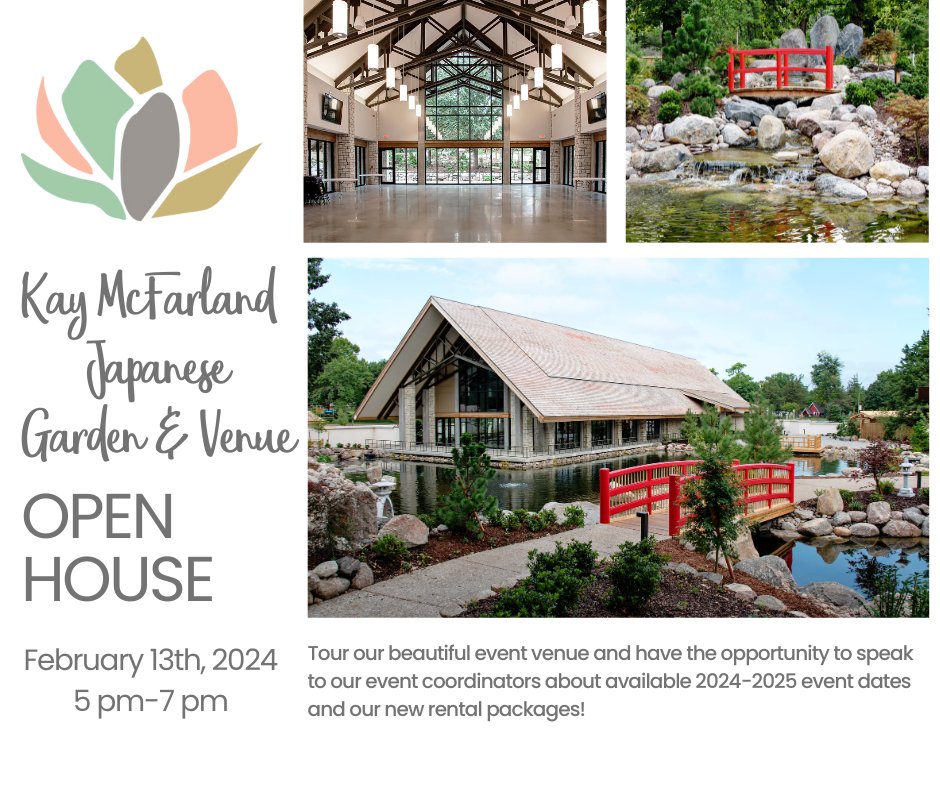- Exploring Kay McFarland Japanese Garden as a unique event venue
- Benefits and logistics of hosting events at natural habitats
- How wildlife conservation integrates with event planning
- The influence of zoology and environmental stewardship on event spaces
- Case studies: Weddings and corporate events at wildlife-centric venues
Kay McFarland Japanese Garden stands as a picturesque and unique event venue, drawing interest from brides, grooms, and corporate event planners. This venue open house, scheduled for February 13th from 5-7 pm, invites all to explore the offerings for weddings and events. Located amidst natural beauty, the garden promises an immersive experience where nature meets celebration.
The Japanese Garden at Kay McFarland serves as an intricate tapestry of curated landscapes and natural elements. The venue embodies tranquility and elegance, making it an ideal backdrop for various functions. The open house event aims to provide insights into the logistics, benefits, and opportunities available for those planning significant events. Attendees will glean how such spaces transform ordinary events into memorable experiences.
Firstly, Kay McFarland Japanese Garden offers a unique setting that aligns with the aesthetic and cultural nuances of traditional Japanese landscaping. The intricate details, from delicately arched bridges to serene koi ponds, create an atmosphere of peace and beauty. These features are invaluable for event aesthetics, providing endless opportunities for stunning photography and an ambiance that guests will remember.
The benefits of hosting events at such natural habitats are manifold. Integrating natural elements into event planning not only adds visual charm but also promotes relaxation and engagement among guests. Nature has a profound effect on human psychology, reducing stress and fostering a sense of calm. This natural allure is particularly advantageous for weddings, where the serene environment can minimize the anxieties typically associated with the big day.
Corporate gatherings hosted in natural settings, such as Kay McFarland Japanese Garden, benefit from the shift away from traditional, often sterile, event spaces. Nature encourages creativity and productivity. These spaces provide a refreshing change of pace, encouraging attendees to engage more fully with the event’s content.
Logistically, the garden offers several amenities to streamline event hosting. All essential services, including catering and decoration logistics, can be organized with local vendors familiar with the space. Understanding the venue’s layout and infrastructure during the open house will empower planners to efficiently coordinate all aspects of the event. Parking areas, accessibility for elderly or handicapped guests, and restroom facilities are crucial elements that will be showcased for seamless event planning.
The integration of wildlife conservation into the event experience at Kay McFarland Japanese Garden exemplifies how zoology and environmental stewardship can enhance event planning. Conservation efforts within the garden demonstrate the venue’s commitment to sustaining local ecosystems. By hosting events here, planners actively contribute to the protection and preservation of these natural environments. This conservation ethos can appeal to environmentally conscious couples and businesses looking to align their celebrations with their values.
Moreover, educational elements can be seamlessly incorporated into events, enriching the experience. Guided tours, informational displays, and interactive sessions on the local flora and fauna provide an engaging aspect that traditional event venues often lack. These activities offer guests a deeper connection to their surroundings and a better understanding of the importance of wildlife conservation.
In understanding the impact of zoological and environmental stewardship on event spaces, one must consider how these elements influence both the ambiance and logistical planning. Zoology, the study of animals, provides valuable insights into managing and maintaining a venue like Kay McFarland Japanese Garden. The careful balance of maintaining a thriving ecosystem while accommodating large gatherings is pivotal. This balance ensures that the space remains both a functional event venue and a sanctuary for wildlife.
Environmental stewardship in event planning extends to sustainable practices such as waste management, the use of eco-friendly materials, and energy-efficient solutions. These measures support the conservation goals of the venue while promoting a responsible approach to event hosting. By limiting the environmental footprint of events, planners contribute positively to the sustainability of natural habitats.
Successful case studies of weddings and corporate events at wildlife-centric venues like Kay McFarland Japanese Garden highlight the feasibility and attractiveness of such locations. Real-world examples demonstrate how these events can be tailored to fit the unique characteristics of natural spaces. For instance, a wedding ceremony taking place amidst the zen garden setting provides an intimate and spiritual backdrop. The natural beauty of the garden enhances the emotional resonance of the ceremony.
Similarly, corporate events held in natural venues often report higher engagement and satisfaction levels among participants. For example, a team-building retreat in the Japanese Garden setting fosters collaboration and creativity, informed by the tranquil surroundings. These case studies underscore the symbiotic relationship between successful events and their natural settings, benefiting planners, guests, and the environment alike.
Ultimately, attending the Kay McFarland Japanese Garden open house is an excellent opportunity for event planners to visualize how this space can cater to various event needs. The commitment to wildlife conservation and the integration of zoological knowledge in maintaining the venue highlights the garden’s suitability for hosting events that are both beautiful and mindful of their environmental impact.
As more people seek meaningful and sustainable ways to celebrate, natural venues like Kay McFarland Japanese Garden provide a compelling choice. The fusion of beauty, tranquility, and conservation principles offers a unique platform for memorable gatherings. Understanding this venue’s potential can inspire planners to create events that leave lasting impressions, foster connections, and contribute to the preservation of natural spaces for future enjoyment.
*****
Source Description
NO RSVP NEEDED! – Calling all brides, grooms, and corporate event planners!
Join us at Kay McFarland Japanese Garden for a venue open house on February 13th from 5-7pm to learn about what all we can offer for your upcoming weddings and events!


